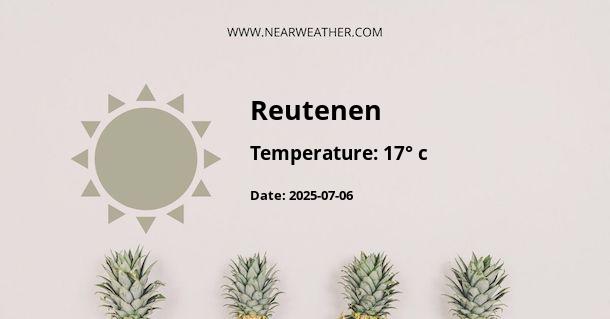Reutenen Weather Today
Daily Weather Forecast & Temperature in Reutenen
Sun & Moon
Location Info
Embed This Weather
Understanding the Climate and Weather of Reutlingen, Germany
In the heart of Europe lies Reutlingen, a picturesque city located in the southern part of Germany, within the state of Baden-Württemberg. Best known for its rich historical heritage and scenic landscapes, Reutlingen attracts tourists and residents alike who appreciate its temperate climate, distinct seasons, and diversified weather patterns. Here, we will dissect the climate and weather characteristics that define Reutlingen throughout the year.
Overview of Reutlingen's Climate
Reutlingen experiences a temperate oceanic climate (Köppen climate classification: Cfb), with year-round precipitation, mild summers, and generally cool winters. Its proximity to the Swabian Jura (Schwäbische Alb) mountain range does impact the local weather, occasionally leading to increased precipitation and microclimates in the surrounding areas.
Seasonal Climate Patterns
"Reutlingen's climate is emblematic of the lush, green landscapes that are prevalent in southern Germany. Its four distinct seasons each hold a unique charm, contributing to the region's biodiversity and the residents' quality of life." – Local Meteorological Bureau
- Spring: Marking a period of transition, spring sees a gradual increase in temperature and daylight hours. The season typically experiences a mix of sunny days interspersed with rain showers, leading to a blossoming of flora throughout the city and the countryside.
- Summer: While summers are relatively mild with average high temperatures in the low to mid-20s Celsius (68–77°F), heat waves can occur. During such episodes, temperatures can occasionally soar above 30°C (86°F), creating a surge in outdoor activities and tourism.
- Autumn: Autumn witnesses cooling temperatures and a gradual reduction of daylight. The foliage transforms into a vibrant display of colors, a kaleidoscope that adorns the city's parks and the surrounding forests. Precipitation remains consistent, although the season progressively gets cooler and wetter.
- Winter: Winters are generally cold, with temperatures often hovering around freezing. Snowfall is common, particularly in the nearby Swabian Jura, painting the landscape in serene whites and offering opportunities for winter sports.
Monthly Temperature and Precipitation Breakdown
Let's delve into a more granular view of Reutlingen's weather by examining the averages for temperature and precipitation month by month.
| Month | Average High (°C) | Average Low (°C) | Precipitation (mm) |
|---|---|---|---|
| January | 2.9 | -1.6 | 40 |
| February | 4.5 | -0.8 | 37 |
| March | 8.9 | 1.5 | 47 |
| April | 13.4 | 4.4 | 54 |
| May | 18.2 | 8.9 | 94 |
| June | 20.9 | 12.0 | 102 |
| July | 23.5 | 14.1 | 101 |
| August | 23.3 | 13.8 | 88 |
| September | 19.5 | 10.3 | 77 |
| October | 14.0 | 6.3 | 58 |
| November | 7.2 | 2.2 | 48 |
| December | 3.8 | -0.5 | 45 |
Note: The data presented in the table above is based on long-term historical averages and is subject to annual variability.
Weather-Related Challenges and Opportunities in Reutlingen
Reutlingen's climate and weather patterns present both challenges and opportunities for the local population, economy, and ecological systems.
Impact on Agriculture
The region benefits greatly from the fertile soils and favorable climate for viticulture, with local vineyards producing notable Swabian wines. The rainy springs and moderate summers are ideal for growing a variety of crops, although occasional hailstorms or frost events can pose a threat to agriculture.
Disruption Due to Weather Extremes
Like many parts of the world, Reutlingen is not impervious to the effects of climate change. An increase in the frequency and intensity of extreme weather events, such as heat waves and heavy precipitation, can cause disruptions and necessitate adaptive measures. For instance, local urban planning now increasingly takes into consideration the need for heat mitigation and flood management strategies.
Tourism Throughout the Seasons
Reutlingen's diverse climate also drives a thriving tourism industry, with each season offering a different appeal:
- In spring, visitors flock to the region to enjoy the blooming landscapes and outdoor activities like hiking and cycling.
- The summer months attract tourists looking for cultural festivals and leisurely exploration of the city's historical sites.
- Autumn is a time for wine tours and enjoying the change of foliage, with the seasonal colors providing a captivating backdrop for outdoor recreation.
- Come winter, the focus shifts to the festive atmosphere of Christmas markets and the possibility of snowy adventures in the nearby mountains.
Future Climate Projections
According to climate models and regional environmental research, Reutlingen may experience an increase in average temperatures, alterations in precipitation patterns, and more frequent extreme weather events over the coming decades. These changes will necessitate continued monitoring and proactive adaptation strategies to mitigate the impacts on the local community and the environment.
Summing Up Reutlingen's Year-Round Weather
The climate and weather in Reutlingen, Germany, provide a dynamic backdrop to this charming city's daily life. Understanding the intricacies of its meteorological tendencies is crucial for sustainability planning, agricultural practices, and ensuring that both residents and visitors can appreciate the natural beauty and cultural richness that Reutlingen has to offer.
What is the Latitude and Longitude of Reutenen?
Reutenen's Latitude is 47.549999 & Longitude is 9.650000.
What is the weather in Reutenen today?
Weather in Reutenen is 2° today.
What is the climatic condition of Reutenen today?
Climate Conditions in Reutenen shows mist today.
What is the humidity in Reutenen today?
Humidity in Reutenen is 90% today.
What is the wind speed in Reutenen today?
Wind speed in Reutenen is 9.25 km/h, flowing at 50° NE wind direction.
What does it feel like in Reutenen today?
It feels like -1° in Reutenen today, with 75% cloud cover and 10 km visibility.
